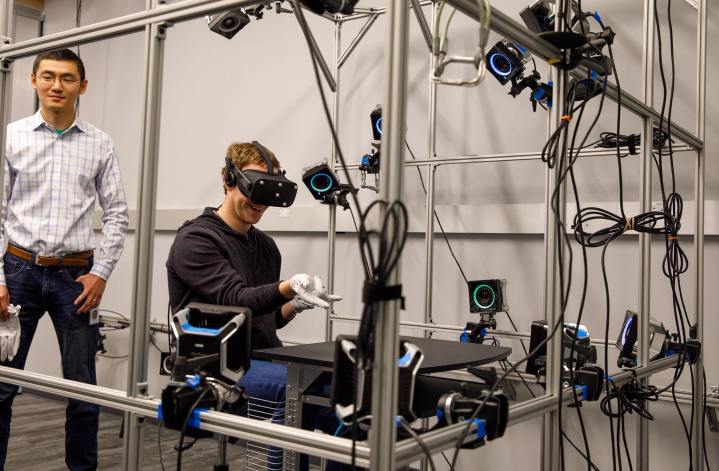
In patents filings made public this week, Oculus describes a couple different technologies that could make its virtual reality even more realistic and immersive. The patents describe a couple methods for simulating touch in VR environments, one of which includes a “skin stretch instrument.”
It’s not as terrifying as it sounds. Pick up any object near you right now, notice how your hand cradles it, which parts of your hand are touching it. Those are the little details Oculus is looking to simulate. A smart phone feels different in your hand than an orange does, or a water bottle, or a coffee cup. These objects all feel different, in part because we hold them differently. Add on to that the fact that everyone holds objects in a slightly different way, and you can see how simulating your sense of touch can get pretty complex.
Oculus’ solution is a simple one: Build a haptic glove that can calibrate itself by simply monitoring how you interact with real objects. The first patent describes a technology that would live in the fingers, fingertips, and palm of a haptic glove. This is the “skin stretch instrument” really what it’s doing is measuring how your skin stretches, or compresses, when you pick up real-world objects. By measuring that, it’s able to calibrate itself to simulate those kinds of pressure.
Think of it this way: By picking up an object, the object is basically pressed against your skin in a couple different places on your hand. These haptic gloves would measure where the object presses against your skin, and how hard, and then using that information it would essentially learn how to use its internal “skin stretching” instruments to simulate physical touch.
To do that, the haptic gloves have a couple different methods at their disposal. First, it appears they will have a number of small “gears” or “rollers” in the fingers and palm of the glove, these will both record the calibration interactions described above, and provide mechanical feedback to simulate touch.
“The skin stretch sensor includes a mechanism that may comprise one or more gears and rollers that rotate when the user interacts with a real object,” the patent application reads. “The feedback surface is configured to simulate a force associated with the interaction with the surface.”
The second patent filing also concerns simulating touch once it’s recorded and calibrated by having the user interact with real-world objects. This patent filing uses expandable bladders hidden inside the haptic glove that can expand or contract, like miniature balloons, to apply pressure to your hands to simulate interaction with real objects.
Editors' Recommendations
- Meta Quest 4: Here’s what we want from the next big VR headset
- This is what Apple’s in-store Vision Pro demo will likely be like
- Best free games on Oculus Quest 2
- Meta believes VR haptic gloves could unlock the future of the metaverse
- The future of immersive VR? ‘Chemical haptics’ applied to your skin


